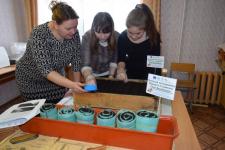Onion experiment: seedlings were grown, now - field work

The current situation has shown that the choice of culture for the study was very insightful, because onion - a treasury of vitamins and minerals, so the abundance of this product will help strengthen the immune system and increase the schoolchildren's resistance to various infections.
The experiment, which involved 28 schools and 3 centers of additional education, started at the end of February. For two months, schoolchildren, under the guidance of teachers, conducted the first stage of the experiment - they studied varieties, sowed them for seedlings, watched and cared for the first sprouts. Most schools sowed onions in boxes, which was more usual. In some schools, for example, in the Opsа school of Braslav district, they decided to try a new technology - planting seeds in "snails".
- The first stage of the experiment at our school can be said to have been a success," says Larisa Garanina, coordinator of the experiment at Luzhki school. - Seeds of all varieties at the end of March showed good germination, more than 80%. Now high school students are taking care of them.
However, many noted that the cultivation of onion seedlings is quite difficult, as before many had no such experience and technology is not fully worked out. Therefore, at the first stage there were a lot of questions, to which participants looked for answers together with the thematic project coordinator, Vladimir Pustoshilo.
- Among the most frequent problems faced by the participants of the experiment were poor growth, yellowing of seedlings, stretching, thin and weak sprouts, - Vladimir Pustoshilo shares. - Together we tried to find the cause and correct the care. For example, seedlings could grow badly and yellow due to poor soil or insufficient amount of it, which is typical for "snails", stretching - because of non-compliance with the temperature regime.
As a result of the first stage, some recommendations were developed that will be useful both in the next stages and in the implementation of the technology. The main recommendations are as follows:
1. The soil for onion seedlings should be loose and porous, so that the roots of the plant feel comfortable. To do this, you can add perlite, vermiculite and coconut flakes to the soil.
2. When sowing in "snails", the seedling may not have enough soil, so additional fertilisation is needed.
3. You should follow the temperature regime. Sown onion seeds before germination are placed in a warm place, after they need to reduce the temperature to 15 degrees. At this temperature, the seedlings do not stretch and grow strong.
4. Onion seedlings need good lighting, otherwise it will begin to stretch.
5. If the seedling is still stretched out, it is better to cut it a little to take care of the development of the root system. For onion seedlings, green mass is not so important.
The experiment participants are already moving on to its second stage - planting seedlings and sowing seeds in the ground to compare which way of growing is better. But to do this, first an experimental plot has to be prepared according to the developed method, which is now being done in schools.
In this way, the experiment will contribute to the main objectives of the project funded by European Union "EU4Youth: School Garden for the Development of Agricultural Entrepreneurship": it will help schoolchildren to master modern agricultural technologies, learn about the prospects of working in rural areas, acquire research and entrepreneurial skills.
This publication has been produced with the support of the European Union and the Green Cross International. Responsibility for the content of this publication lies with the public organization “Green Cross Belarus”, and it can in no way be taken to reflect the views of the European Union and Green Cross International.
